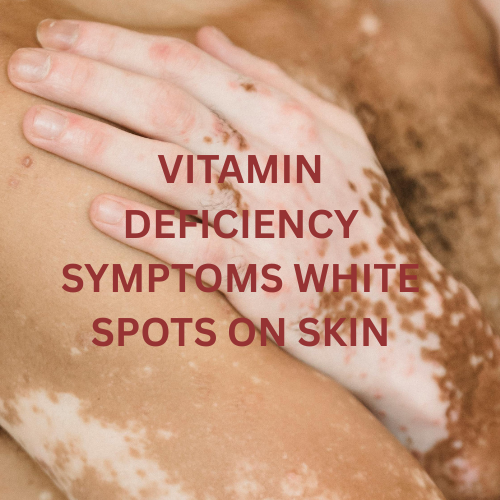Understanding Vitamin Deficiency Symptoms: White Spots on Skin
Having good nutrition is crucial to health overall, but most people tend to miss the minute signs their bodies display when something is missing. One such indicator is the development of white spots on the skin, which are usually attributed to nutritional deficiencies. The subject is discussed in depth in this blog post, which addresses vitamin deficiency symptoms white spots on skin, and guides on how to treat them effectively.
What Are White Spots on Skin?
White spots may occur on the skin due to several reasons. These tiny patches may appear on the arms, legs, back, or even face. These are usually painless but may become very apparent after a long period. Though white spots can be caused by certain conditions, such as vitiligo or infections caused by fungi, there are increasing numbers of white spots related to nutrition.
Among the most underappreciated reasons are vitamin deficiency symptoms white spots on skin, such as white spots on skin, which indicate a deficiency of certain nutrients that the body needs for healthy skin.
Common Vitamin Deficiencies That Cause White Spots
Some vitamins have a direct role in skin healing, pigmentation, and immune protection. When the body is not supplied with adequate amounts of these, it might begin to exhibit telltale signs.
1. Vitamin B12 Deficiency
Vitamin B12 is essential for producing healthy red blood cells and supporting nerve function. A lack of B12 can lead to skin changes, including pale patches or white spots. People who follow a vegan or vegetarian diet are at higher risk because B12 is primarily found in animal products.
2. Vitamin D Deficiency
Vitamin D is one of the nutrients that plays a significant role in an individual’s health and their immune response. Inadequate amounts may undermine skin integrity, resulting in vitamin deficiency symptoms white spots on skin, such as white spots on the skin, mainly exposed to the sun.
3. Vitamin E Deficiency
The vitamin is recognized to have antioxidant benefits for skin cells. Therefore, in case of its deficiency, it will result in dry, flaky skin and irregular pigmentation, including probably white spots.
4. Calcium and Zinc Deficiencies
While not vitamins, calcium and zinc are a couple of minerals that play crucial roles in the maintenance of skin health. Deficiency states lead to poor skin healing, sensitivity, and whitening of the skin.
Who Is at Risk?
These groups are more vulnerable to developing vitamin deficiency symptoms white spots on skin, such as white spots on the skin:
- People with limited diets that are vegan, keto, or low-fat.
- People with digestive disorders such as celiac disease and Crohn’s disease.
- The elderly have decreased nutrient absorption.
- Those who obtain minimum amounts of sun exposure or refuse fortified foods
If you are one of these, then your risk of getting white spots caused by vitamin deficiency is increased.
Other Symptoms That May Accompany White Spots
White spots may be minimal on their own; however, they can be one symptom of some broader health condition. Some of the other signs that accompany white spots include:
- Tiredness or weakness
- Brittle nails and hair fall
- Mouth ulcers or inflammation of the tongue
- Tingling in hands or feet
- Poor wound healing
When these symptoms combine with vitamin deficiency symptoms white spots on skin, such as white spots on the skin, it becomes clear that a medical evaluation is necessary.
Diagnosing and Treating the Deficiency
If you notice white spots on your skin that do not fade over time, consult a healthcare provider. A simple blood test can help determine if vitamin deficiency symptoms white spots on skin.
Once diagnosed, treatment often includes:
- Dietary changes: Increasing intake of nutrient-rich foods such as leafy greens, dairy, eggs, fatty fish, nuts, and fortified cereals.
- Oral supplements: In cases where diet alone is not enough, supplements can quickly restore vitamin levels.
- Lifestyle adjustments: Spending more time outdoors can help with vitamin D production, while reducing stress may also support better nutrient absorption.
As treatment begins, many individuals see improvements in skin appearance, including a reduction in vitamin deficiency symptoms white spots on skin, such as white spots on the skin.
Preventing Future Deficiencies
Prevention is always better than a cure. Here are a few ways to avoid future nutrient-related skin issues:
- Eat a balanced diet covering all essential vitamins and minerals.
- Have regular health checkups and blood tests
- Avoid over-reliance on processed foods.
- Stay hydrated and exercise regularly.
- Consider supplementation if recommended by a doctor.
Consistent care will facilitate improvement in skin health, besides general well-being.
When to Seek Help
If the white spots are spreading, itching, or are related to other health issues, see a doctor immediately. It is common for cases of vitamin deficiency to display white spots on the skin, but there are different kinds of skin diseases with similar manifestations. Only through proper diagnosis will one get the right treatment.
Final Thoughts
Your skin can inform you a great deal about your inner health. If you are experiencing vitamin deficiency symptoms white spots on skin, such as white spots on skin, don’t turn a blind eye. They are usually an early indication that your body is not receiving the nutrition it requires. With early care, nutritional changes, and counseling from a health practitioner, you can recover both your skin and your general well-being.


